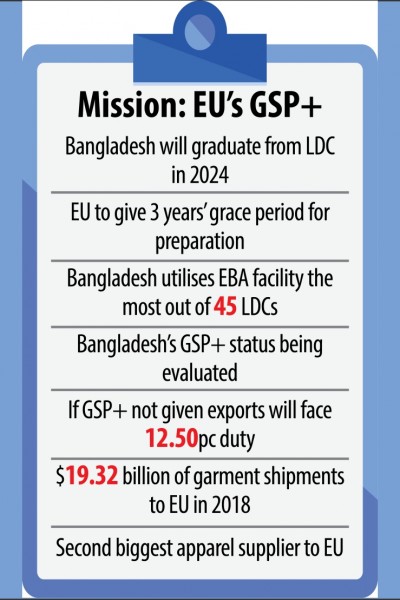Bangladesh must comply with ILO standards for GSP Plus

The European Union wants a guarantee from Bangladesh that its factories would ensure fair practice and comply with the International Labour Organisation standards if the country wants to enjoy continued trade privilege from the bloc following graduation to the developing country bracket.
“We have to make sure that all these [goods] are ILO-compliant and of course, compliant with our own standards,” said Rensje Teerink, the EU ambassador to Bangladesh, at a discussion on “EU and the contemporary global scenario: a reflection for the future” at the Six Seasons Hotel in Dhaka.
Bangladesh is set to lose its current trade privilege of zero-duty export benefit under the EU’s Everything but Arms (EBA) scheme when the country makes the transition in 2024.
As the EU will give three years to Bangladesh as a grace period to ensure a smooth transition, the country will finally lose the Generalised Scheme of Preferences (GSP) in 2027.
Once the country loses the preferential treatment, Bangladesh will have to face nearly 12.50 percent duty on exports to the EU as a developing country.
But Bangladesh can continue to export duty-free if it can manage EU’s GSP Plus status by meeting some conditions such as core conventions of the United Nations, including practising good governance, following international standards on labour rights and human rights and ensuring protection of environment.
“The goods need to be produced following the sustainability of environment, labour rights and human rights,” Teerink said.
The EU is evaluating the practices of Bangladesh about the core conventions and this will determine whether the GSP Plus status will be granted or not after the formal graduation.
Currently, eight countries enjoy the GSP Plus benefit. The countries are Armenia, Bolivia, Cape Verde, Kyrgyzstan, Mongolia, Pakistan, the Philippines and Sri Lanka, according to the EU website. The Rana Plaza tragedy back in 2013 opened the eyes of the European consumers and called for some correction plans, which must be done, Teerink said.
“This is why the Accord, the Alliance and the Sustainability Compact were created.”
So far, Bangladesh has put in place a number of commendable changes on workplace safety in the garment sector.
“Despite the commendable changes, more progress is needed in the sector,” Teerink added.
The EU is working on the EBA scheme, which offers duty-free trade privilege to 45 least-developed countries, including Bangladesh.
“The EBA has really helped Bangladesh from the very beginning of the scheme. It is a major instrument that really helped Bangladesh more than the bilateral aid.”
Among the LDCs, Bangladesh is the highest beneficiary of the EU’s trade privilege, particularly because of higher garment export to the bloc.
In 2018, Bangladesh exported $19.32 billion worth of garment items to the EU, up 11.17 percent year-on-year, making it the second largest apparel exporter to the bloc.
“There is no other organisation like the EU that can help Bangladesh in such a big way,” she said, adding that that does not come without strings attached.
This becomes even more important for Bangladesh as the country is under the scrutiny of the EU, the diplomat said.
So far, Bangladesh has responded very well to the EU’s call on compliance, she said.
A high-powered delegation from the EU will visit Bangladesh in March. Bangladesh will have to change its business model with the EU because of the change of consumer behaviour in Europe, according to the EU diplomat.
While delivering the keynote speech, Danilo Turk, a former president of Slovenia, suggested Bangladesh establish a warm relationship with the UK apart from the EU, so that the privileges are retained even after changes like Brexit and the LDC graduation.
Usually, the UK plays a vital role in mending the EU-Bangladesh relations in case of any problem because of their historic ties.
However, after Brexit the UK might not play the same role in the EU for Bangladesh.
So, Bangladesh needs to strengthen the relationship with the EU Commission, Turk said.
“Textile and garment industries are not any permanent industries for any country. So, Bangladesh needs to diversify its export products,” he added.
The Cosmos Foundation organised the symposium where diplomats from home and abroad, government high-ups, researchers and international relations experts also spoke.
Iftekhar Ahmed Chowdhury, principal research fellow at the Institute of South Asian Studies at the National University of Singapore, moderated the event.
